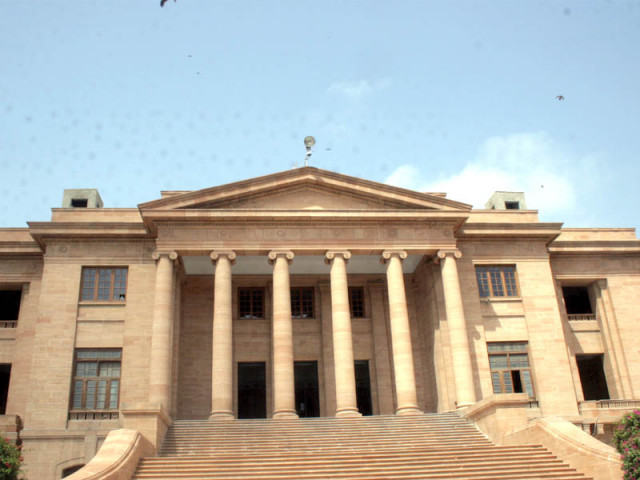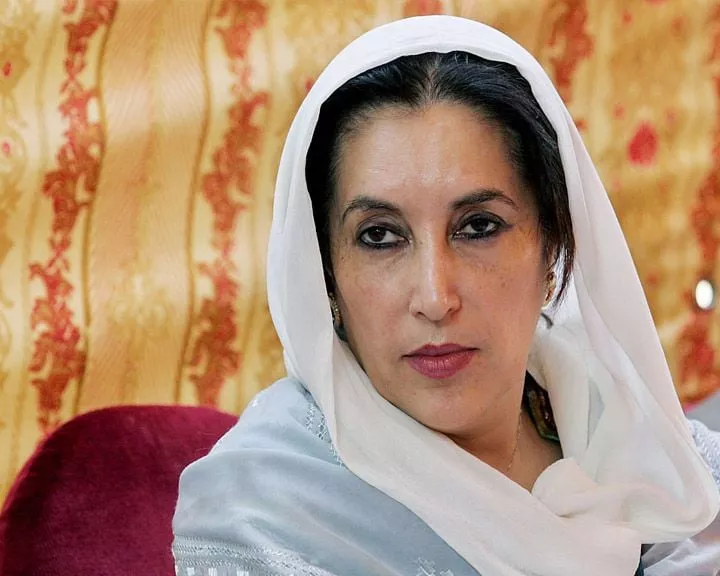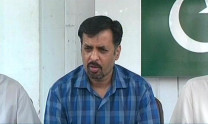High court summons Sindh IGP over plea seeking stiffer penalty for rape
Directs mother of missing infant to challenge report concluding her DNA does not match with that of the child

Sindh High Court : PHOTO: EXPRESS
The plea was heard by a two-member bench comprising Justice Muhammad Ali Mazhar and Justice Yousuf Ali Sayeed.
In the plea, the petitioner, Kainat Soomro, maintains that the Supreme Court (SC) has ordered the formulation of a "modern mechanism" to ensure effective investigation of rape cases. Moreover, the apex court has also ordered to amend laws pertaining to the prosecution and trial of accused in rape cases, the plea states. Soomro has claimed in the petition that the accused are acquitted in such cases due to "ineffective laws."
Soomro has moved the court to order reforms in laws pertaining to DNA testing and other decrees related to rape cases.
At this, the court inquired as to why arrangements for video conferencing during the hearing were not made and other measures directed by the court not been taken. "Who will install the cameras and the screens?" the court remarked.
Concluding the hearing, the court ordered Sindh IGP and members of the investigation team to appear before the court at the next hearing on February 13.
Infant's disappearance case
Meanwhile, another bench directed the mother of an infant, who went missing from Dr Ruth Pfau Civil Hospital, to challenge the findings of the DNA report submitted by the Health Department of Sindh and concluding that DNA of the child the aggrieved parents suspected to be theirs did not match their samples.
A two-member bench, comprising Justice Muhammad Iqbal Kalhoro and Justice Irshad Ali Shah, issued the directive during the hearing of the plea pertaining to the disappearance of the infant from the hospital, filed by the missing newborn's mother, Hina Ashfaq.
In the plea, the petitioner claims that she has been searching for her son for the past four years and alleges that "police colluded with the doctors involved in the infant's disappearance." The allegation is made on grounds that CCTV cameras at the hospital were dysfunctional on the day the infant went missing, the plea states.
The provincial health department submitted a report to the court, contending that the DNA of the child that the petitioner suspected to be hers did not match her and her husband's samples.
At this, Ashfaq argued that the DNA report is that of a seven-year-old child while her son would be four years old now.
The court directed Ashfaq to challenge the report's findings in the court.
According to police, a woman and some beggars, suspected of being involved in the infant's abduction, have been arrested on the petitioner's indication.
Wheat crisis
The bench comprising Justice Mazhar and Justice Sayeed, issued notices to the federal and the provincial government over a plea pertaining to wheat shortage, smuggling and hoarding.
The petitioner, Mehmood Akhtar Naqvi, has stated in the plea that wheat crisis in the country was a consequence of inflation and the incumbent government had failed in dealing with the crisis. He claims that the crisis is "created artificially", on grounds that "wheat was being smuggled outside Pakistan for the past six months by a mafia that intended to earn billions [from the illegal trade]."
Naqvi has moved the court to order the formation of a joint investigation team (JIT) to investigate the issue, also requesting that SHC seeks details on "wheat smuggling".
The court has sought replies from the federal and the provincial government on the plea, directing them to submit their replies by February 7.
Eligibility challenged
The same bench sought a reply from Pakistan Tehreek-e-Insaf leader Haleem Adil Sheikh's counsel on a plea challenging his client's eligibility to hold a provincial assembly seat. The bench issued the directive after Sheikh's counsel submitted a power of attorney in the court.
The petitioner, Abdur Raheem, has challenged Sheikh's eligibility claiming that he had not provided the Election Commission of Pakistan (ECP) complete details of his assets. He has contended in the plea that Sheikh's account statements presented to ECP lack details of expenditures by his daughters, Mariam Haleem and Aisha Haleem. Raheem has claimed in the petition that their expenses are paid for via an overseas account in the Bank of New Jersey, in the United States of America. Moreover, details pertaining to Sheikh's Nawabshah Poultry Complex have not been submitted to ECP, the petitioner has stated in the plea, adding that details of the overseas bank account, including the account number, have been attached with the plea. On this basis, the plea moves the court to declare Sheikh ineligible to hold a seat in the provincial assembly.
Sheikh's counsel, Advocate Haider Waheed sought an extension to submit a reply on the plea. Granting him an extension, the court directed him to submit the reply on February 13.
Bail approved
In another case, pertaining to vandalism and interference in state affairs, Justice Muhammad Saleem Jessar approved Sheikh's protective bail.
Sheikh's counsel claimed, "Police have registered a case against my client for political reasons, on the orders of Pakistan Peoples Party leaders."
He requested the court to restrict the police from arresting Sheikh.
Accepting his request, the court barred the police from arresting Sheikh and approved his protective bail, directing him to submit a surety bond of Rs100,000. It also directed Sheikh to appear before a trial court within a week.
'Half-fry' case
Meanwhile, the bench comprising Justice Kalhoro and Justice Shah sought a report from the Home Department on an alleged fake police encounter during which Dr Deepak Raj was 'half-fried', a term used by police for those injured during encounters.
A plea filed in SHC maintains that Dr Raj was injured in a staged police encounter carried out by Hyderabad DIG Irfan Baloch, even when no case was registered against Dr Raj.
Fourth schedule list
The same bench sought from relevant authorities a detailed report on the addition of a citizen's name in the fourth list.
The citizen appeared before the court at the hearing and said that he ran a garment shop in Sher Shah and had to present himself at a police station daily. "My name has been added in the fourth schedule list twice," he said, adding that he has not been informed about the reasons behind the inclusion of his name in the list.
Irked at this information, Justice Mazhar rebuked the authorities on their negligence. "Don't you check before issuing a notification?" he remarked, adding that how could a citizen's name be randomly added in the fourth schedule list. The court directed that the reason behind the inclusion of the citizen's name in the list multiple times be identified and sought a detailed report on matter from relevant authorities. Issuing these directives, the court adjourned the hearing till February 19.
Court disposes of plea
In another case, the bench disposed of a plea seeking an increase in the number of high court and sessions court judges, after the petitioner withdrew the plea.
The plea stated that SHC was short of two judges and sessions court too faced a shortage of judges. It sought an increase in the number of judges, keeping in view "the growing number of cases burdening [shorthanded] courts."
Hearing the plea, the court remarked that is was not authorised to order the appointment of judges in SHC, however, adding that it could issue directives for the appointment of judges in the sessions court.
The court remarked that it would hear the plea if sought an increase only in the number of sessions court judges and disposed it of after the petitioner withdrew it.
Published in The Express Tribune, January 22nd, 2020.



















COMMENTS
Comments are moderated and generally will be posted if they are on-topic and not abusive.
For more information, please see our Comments FAQ